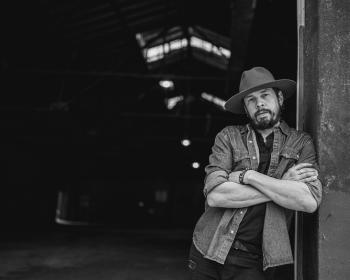Image Caption
Summary
Local Journalism Initiative Reporter
Windspeaker.com
“Hold my head up, so I don’t fall”, a line from Nelson Little’s newest single “High Road”, captures how most of society felt during the past two years while living through the COVID-19 pandemic.
Little, a Métis country music artist, had originally written the lyrics based on his experiences with his 10-year-old son, who was struggling during that time and looked to his dad for guidance.
“It was a heavy year,” said Little. “That’s how the song came about, from the emotions and the stress. From that I was like ‘how can I give this boy advice? I don’t even have it for myself’.”
During that time, Little took time off work and spent his afternoons homeschooling and emotionally supporting his son.
Like “High Road”, Little said the lyrics for his songs come from his own real life experiences and emotions.
Born near Thompson, Man., Little was raised on a farm just north of Riding Mountain with his aunt and uncle.
When he was 15 years old, Little was in a car accident in which his cousin, Keith Little Jr., died.
“From there I guess I just felt lost because now I was on their farm without my male cousin, who I felt like the farm belonged to in their family. Music just took me away from there,” a source of therapy for the surviving teen.
“That would have been from the age of 15 to 18. The guitar probably stayed in my hands from there on.”
During those years, Little’s uncle recognized his nephew’s musical ability and began taking him to talent shows and various community events. Little would perform cover songs, but never any original music.
“For the most part it was 10 years of just hauling my guitar around,” he said, singing at weddings, funerals, graduations and any many other social event.
He also joined a cover band called the 100 Years Rising.
“After a little experience with that band, probably 10 years, I figured it was time to write because I carried a lot. So in 2004 was when I started writing,” he said.
His first single “I Won’t Fall Down” was about how when you make mistakes you need the strength to get back up. His second original song “Whiskey Devil” told the story of the lifestyle of his early years in a band.
“There was a lot of partying going on in our twenties, early on in our band years,” Little said. “I wrote a positive twist to a possible negative outcome, which was if we kept drinking someone was going to end up dead.”
It was after Little saw the response to his original song lyrics that he realized he could combine his passion for playing guitar with writing.
“After those two songs, they had a bit of success around home, I realized I could write, and I just started writing song after song.”
During the past two decades Little has been a three-time Manitoba Country Music Association award nominee and winner of the Aboriginal People’s Choice Music Award.
Another single, “Keep Me Close”, earned Little the number one spot on the Indigenous Music Countdown in 2020. His track “Lost and Found” was added to SiriusXM’s Indigiverse and was played regularly for two years while his song “Only You” was selected to be used in the Canadian Film Road of Iniquity directed by Mark Ennis.
On May 20, “High Road” was released. Little said he’s looking forward to performing it for his fans.
He believes the song will be very relatable to his audience no matter what age or walk of life they come from.
During the pandemic there was so much separation between people, families and marriages because of the different views everyone held about the various protocols put in place, he said. In such a strange time, many people felt isolated in their own opinions because they didn’t want to argue with their loved ones.
“I was writing about how we could just neutralize that. (The best way) was to take the high road, turn away and walk away. Keep your head up,” Little said.
“One of the strong lines in the song is ‘Let those sleeping dogs lie in someone else’s bed’, (meaning) just to leave a small problem alone. There’s no point (arguing). There’s no point.”
Local Journalism Initiative Reporters are supported by a financial contribution made by the Government of Canada.

